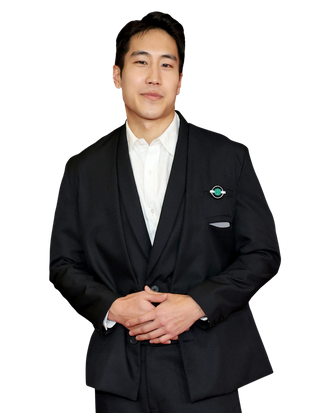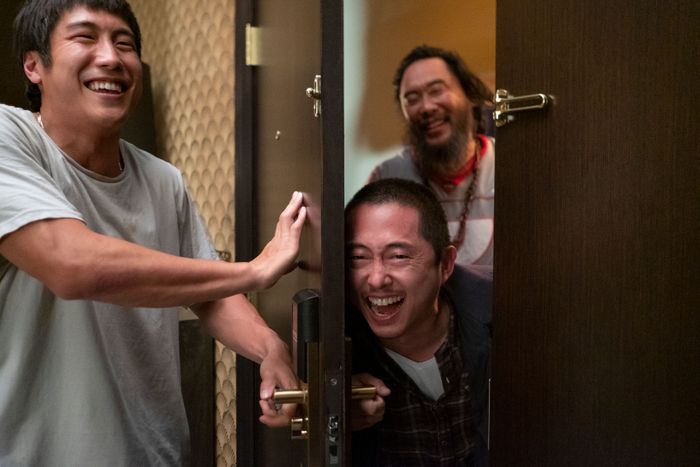
Spoilers follow for the series Beef, all 10 episodes of which debuted on Netflix on April 6.
After Amy Lau (Ali Wong) and Danny Cho (Steven Yeun) race into their feud in Beef, nearly everyone in their lives becomes collateral damage. And although finale “Figures of Light,” written and directed by series creator Lee Sung Jin (who also goes by Sonny), ends with Amy and Danny in each other’s arms, they get there by cutting out the same person they cared for: Paul (Young Mazino), Danny’s younger brother and Amy’s lover.
“That might set him off,” laughs Mazino in response to Beef ending with the hint that Amy and Danny’s relationship turns romantic. “You take my future, and you take my girl? Wow.”
Misled by Danny for years (after his older brother threw out his college applications) and by Amy during the course of their affair (which began when she catfished him), Paul is one of the series’ most sympathetic characters. Sure, he initially seems like an irritating crypto bro, ignoring Danny’s attempts at a closer relationship to hang out with “my boys” and calling Amy a “bitch” nearly immediately after they have sex. But the subtleties of Mazino’s performance, from his refusal to make eye contact to his often-murmured line deliveries, hint at Paul’s isolation and precarious internal life. As the season progresses and Paul is torn between “peninsula mentality” loyalty to Danny and his infatuation with Amy, we watch the younger Cho Bro come of age — a process that Mazino isn’t averse to further exploring in a second season, if Beef were to receive a renewal.
Before we met them, I wondered whether Paul’s “boys” actually existed, or if he made them up to get distance from Danny. So often, Paul just seems lonely.
Definitely, I think Paul’s a lonely person. I can relate to that: Growing up, I had a lot of alone time because my sisters were always doing their own thing. Paul does have some boys, but I don’t think he has a core group of people that he can truly rely on. When you come from an immigrant family, there’s a lot that’s missed out on in the cultural exchange, especially if it’s a rough journey to get situated. His parents go back to Korea, he’s raised by his toxic older brother, he falls out of church and never goes to college. He misses out on two of the very quintessential communities that make up a lot of Asian American culture. He’s already on the edge. There’s a lot of factors that lend to him wanting, almost preferring, to be by himself, because no one truly understands. And if they did understand, they’d want to be alone, too.
I would spend a lot of pre-production days going to PC cafes. There’s a lot of people in the rooms, and everyone’s by themselves. I grew up playing video games. It’s a great form of escapism, it’s a closed loop — what the variables are, the outcomes — and it’s predictable. It’s safe, especially for someone who can get so lost in thought, like me and Paul. Games are a way of dampening it all and focusing on this 30-minute session of trying to win, versus in life, where it’s chaos incarnate. A mixture of fear of what’s out there and never having that infrastructure to begin with — I think it all ends in a loneliness that could still exist even when you’re with other people.
Episode four is really pivotal for Paul. We see that he can be sneaky and strategic, as he tricks Danny and Isaac into getting drunk and then steals Danny’s truck to meet Amy in Las Vegas. How did you, Steven, and David Choe approach the scene?
That was one of the first scenes that me, Steven, and David worked on. It was great because on one hand, one of my scene partners is Steven, a prolific actor who is so seasoned and so good at his craft, and then you have David, who was this wild card of wild cards. His real life is more surreal than anything you could write. Combined with me being a rookie, it was very electric. I got to look at Andrew Cooper’s behind-the-scenes photos and half the time we’re just cheesing. When all our energies collide, you can really see it. Danny is kind of mediating, but has his own agenda; Isaac completely has his own agenda; I’m just trying to get mine. It’s funny that you mentioned that as a turning point because that was when things started to get like, All right, I think we feel the energy warmed up.
Also in that episode, Paul is the first person to notice how similar Amy and Danny are, and he has that heartbreaking line, “I don’t need that negative energy in my life,” which really rattles Amy. How did you and Ali work together on that scene?
It helps that Ali is so wildly successful in real life, and as of now, I’m still a struggling actor. [Laughs.] That dynamic was there. We approached it by meeting up, going on walks on the beach for several hours. That helped us connect and talk, and we realized we share similar values on how we look at family. She was so open, and that’s really important for the kind of scenes that we were working on.
You bulked up to play Paul, but you play him as shrunken into himself. How did you find that physicality?
Growing up, I was a really small kid, and I would get attacked by people just because I was a small kid and I had a violin case. Getting hated on for no reason, and I’m like, “I didn’t do anything!” [Laughs.] So then I was trying to minimize my presence. In church and in the Asian American community, which is a lot more collectivist and homogeneous, you don’t want to stand out. I had this innate understanding of Paul and what was going on with him internally. Even in high school, when I started to get taller and went through puberty and started playing sports, that never really went away, that little feeling.
Before I got the audition, I came back from this documentary I was shooting with a friend. We grew up together; he’s Korean, and this was after the Asian hate stuff. We started in Tucson and reached the border to Canada. His younger brother was with us, and I spent two and a half months traveling with this kid who is 17, much taller and huge. He’s much bigger than his older brother, but his older brother went to military college and was our survival expert when we were out there in the wild. Seeing that dynamic and observing him — not as an actor, just as a human — I related to what he’s going through. I drew a lot of inspiration from him and other people that I grew up with. We shot out of sequence, but I wanted to gradually have him physically be a little more [draws himself up to full height, sticks out his chest], so by episode nine, when he’s like, “Let’s escape, let’s get out of here,” he’s opened up.
Can you talk about your line delivery of “I’m realizing money is really important” in episode six? It’s a little ashamed and a little surprised.
He can’t just dream of traveling the world. There are some hard, set boundaries and rules that are defined by your monetary value and how much you can accrue, and when you come to that realization that unfortunately money does rule a lot of this world, it’s a sobering moment. That changes people’s mentalities; that can alter someone’s entire trajectory in life.
I had to make that decision a few years back when I reached five years in my corporate job as an analyst and I got my fancy watch. After another five years, you get a bigger watch. And after 10 years, you get an even bigger watch, and you get three more vacation days. [Laughs.] That promise of stability, I see the allure. Paul’s having that moment. At the end of the season, with the realization that his own freaking brother is contributing to why he couldn’t get to college, I wonder if he’ll turn into some toxic Andrew Tate version of himself and be jaded. That’s what happens to a lot of people; it’s that moment where the switch gets flipped. Fuck all that, I’mma just stack my money, and then we’ll deal with everything. But who knows if that’s the right path.
What you’ve described is exactly the mentality that I think pushed Isaac into being terrible, and I’m like, “Please, Paul, do not become Isaac!”
Paul sees that Isaac went off the deep end. He’s like, “Fuck police, fuck the rules,” and I understand that. If you look deep enough and you look hard enough at the system that we’re all in, you start to see the cracks, you start to see the disparities. Not everything makes sense and not all the rules are right.
The church basketball championship and the mansion shootout are paired moments for Paul: the former is a triumph shared between Paul and Danny, and the latter is a rupture when Paul learns that Danny threw away all his college applications. What was filming like on those scenes?
I grew up playing in these basketball tournaments, and that shit was life or death. It was so epic, it was so intense. I would fall in love with girls from the other churches that came in to watch the games. That’s such a defining and nostalgic moment from my childhood. It was so refreshing to have that scene and to just ball out.
The other scene was more serious, but that was also just as fun — if not more fun. As an actor, those are the scenes that you really want to work on, and to work on that with someone like Steven, it was incredible. In that last scene, when he’s telling me to leave, his line originally was, “You have to get out of here. Just get out of here, get away.” But Steven found his line of, “You got to get away from me.” That hit a chord in me, and I think it hit a chord in him. That just spoke volumes about how it can really be the ones you love that can oftentimes be both your fortress and your prison.
Do you think Paul would ever forgive Danny?
No. But I think that he could still love his brother and be there for him, if he really needed him. Family, particularly in Korean and Korean American culture, is so important. He’ll never forget, he’ll never get over this. But I think that there’s still love, and love is irrational.
Finally, did you have a favorite needle drop that was used in the series?
When I was going through my angst back then, Incubus’s “Drive” — that song was my jam. The way that it gets incorporated in episode three, Danny’s playing the cover, and he starts to smile to himself, and then it hits? Jake Schreier! I tell people, “Jake Schreier’s a GOAT,” and he thinks I’m just saying that because he’s making Marvel films. But he’s super-talented. If anything comes out of this interview, it’s that Jake Schreier is a GOAT.
This interview has been edited and condensed for clarity.



